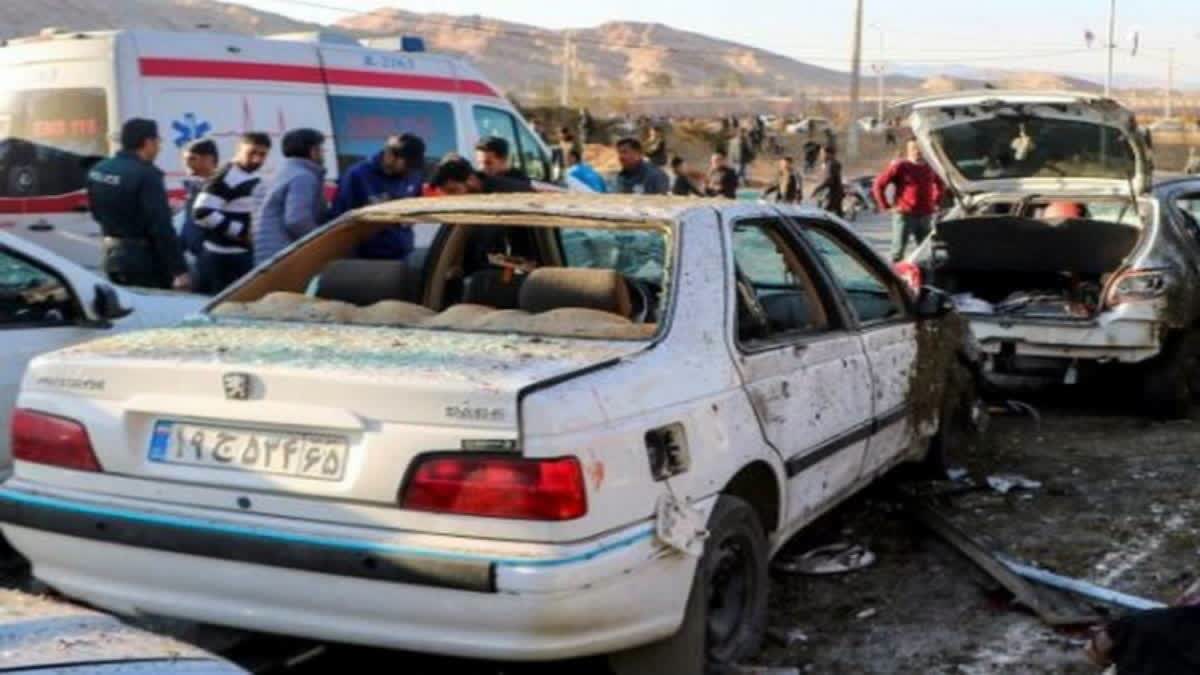New Delhi: Despite wide speculations about Israel being behind the blasts at a cemetery in Iran’s Kerman city on Wednesday that has claimed nearly 100 lives so far, Tel Aviv’s involvement in the incident is unlikely given the war in Gaza.
Two explosions went off 10 minutes apart near the burial site of Iran’s top commander General Qassem Soleimani in Kerman on Wednesday as thousands of people had gathered to mark his fourth martyrdom anniversary. Till the time of filing of this report, 95 people have been reported dead.
The Kerman blasts came amid Israel’s ongoing war with Hamas, the Palestinian outfit believed to be backed by Iran. The explosions came after the killing of the Hamas second-in-command Saleh al-Arouri in an Israeli drone attack in Beirut, Lebanon, on Tuesday. On Monday, Sayyed Reza Mousavi, a senior commander in the Iranian Army, was killed in an Israeli airstrike in Syria. Given the ongoing war in Gaza, there have been widespread speculations that Israel might be behind the blasts in Iran.
Iran immediately pointed its finger at Israel for the attacks. “Make no mistake. The responsibility for this crime lies with the US and Zionist regimes (Israel) and terrorism is just a tool,” Mohammad Jamshidi, political deputy of Iranian President Ebrahim Raisi, posted on X (formerly Twitter).
However, the US has said that neither it nor Israel has any hand in the dastardly attacks. “The United States was not involved in any way... We have no reason to believe that Israel was involved in this explosion,” US State Department spokesman Matthew Miller said.
Asked about the blasts, Israeli army spokesman Daniel Hagari said: “We are focused on the combat with Hamas.” Meanwhile, Iran’s supreme leader Ayatollah Ali Khamenei blamed “evil and criminal enemies” of the country for the attack and vowed a “harsh response”.
So, why is an Israeli hand being suspected behind the attacks?
The predicament that Israeli Prime Minister Benjamin Netanyahu has found himself in following his country’s launch of the war in Gaza in retaliation to the Hamas’s attacks in Israel on October 7. Nearly 22,000 Palestinians, mainly women and children, and over 1,200 Israelis have lost their lives during the war.
Netanyahu has found himself in a position of weakness after coming under domestic political pressure and worldwide criticism for Israel’s disproportionate response to the Hamas attacks.
Israel’s Supreme Court struck down a key component of Netanyahu’s contentious judicial overhaul plan. While the plan is not directly connected to the war effort, it was the source of deep divisions inside Israel and had threatened the military’s readiness before the October 7 Hamas attack that triggered the ongoing war.
Apart from the Israeli Supreme Court’s ruling going against him, Netanyahu is under international pressure, including from the US, Israel’s biggest supporter, to lower the intensity of the war in Gaza. Israel will also now have to contend with a case in the International Court of Justice filed by South Africa for genocide of Palestinians.
According to reports, the Israeli military has confirmed that it was pulling thousands of troops out of the Gaza Strip, a step that could clear the way for a new long-term phase of lower-intensity fighting against the Hamas militant group.
All these indicated that Netanyahu is trying to extend the Israel-Hamas war on different fronts so that he can stay in power. He knows that if the war ends, he will lose his prime ministership. Only 15 percent of the people in Israel want him to continue in his post once the war ends. Netanyahu has been saying that he wants the Israel-Hamas war to continue for at least one more year.
Given Israel’s airstrike in Syria that claimed the life of senior Iranian army commander Sayyed Reza Mousavi and the drone attack in Beirut that killed senior Hamas leader Saleh al-Arouri, there are suspicions that Israel might have hand behind in the Iran explosions. By opening the war on different fronts, Netanyahu may be trying to stick to power.
However, according to R Dayakar, former Indian Ambassador toIraq and Jordan who also served in the West Asia desk of the Ministry of External Affairs, Israel is unlikely to have had a hand in the explosions in Wednesday’s explosions in Iran.
“The twin bomb blasts in Kerman near the mausoleum of Gen. Qassim Suleimani in Kerman do not appear to be the handiwork of Israelis given the nature and pattern of past attacks in Iran attributed to Israel which basically targeted Iran’s nuclear facilities and some key persons believed to be involved in bomb making and only using human sleeper cells and remote controlled spyware,” Dayakar told ETV Bharat.
“Also, Israel appears to use its external intelligence assets carefully and conservatively and does not seem to risk them to flog a dead horse.”
Dayakar said that the terrorist attacks in Kerman do not seem to have a link to the Gaza situation but could be an act by a non-state entity involved in ethnic and sectarian strife in the region in Iran’s immediate neighbourhood. This entity might have been opposed to the Iran regime and also possibly suffered at the hands of Suleimani.
“The ISIS is known to have targeted huge gatherings rather than individuals,” he said. “One difference in Kerman blasts is that the ISIS is more prone to use suicide bombers rather than planting of timers. The ISIS has so far remained politically agnostic towards the Hamas-Israel fighting. If the ISIS is really behind Kerman bombings, it will not be long before it lays claim for it.”
Read more



